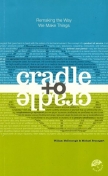BKMT READING GUIDES
Cradle to Cradle: Remaking the Way We Make Things
by William McDonough, Michael Braungart
Paperback : 193 pages
0 club reading this now
0 members have read this book
"Reduce, reuse, recycle" urge environmentalists; in other words, do more with less in order to minimize damage. As William McDonough and Michael Braungart argue in their provocative, visionary ...
Introduction
(A manifesto for a radically different philosophy and practice of manufacture and environmentalism
"Reduce, reuse, recycle" urge environmentalists; in other words, do more with less in order to minimize damage. As William McDonough and Michael Braungart argue in their provocative, visionary book, however, this approach perpetuates a one-way, "cradle to grave" manufacturing model that dates to the Industrial Revolution and casts off as much as 90 percent of the materials it uses as waste, much of it toxic. Why not challenge the notion that human industry must inevitably damage the natural world, they ask.
In fact, why not take nature itself as our model? A tree produces thousands of blossoms in order to create another tree, yet we do not consider its abundance wasteful but safe, beautiful, and highly effective; hence, "waste equals food" is the first principle the book sets forth. Products might be designed so that, after their useful life, they provide nourishment for something new-either as "biological nutrients" that safely re-enter the environment or as "technical nutrients" that circulate within closed-loop industrial cycles, without being "downcycled" into low-grade uses (as most "recyclables" now are).
Elaborating their principles from experience (re)designing everything from carpeting to corporate campuses, the authors make an exciting and viable case for change.
Paper or plastic? Neither, say William McDonough and Michael Braungart. Why settle for the least harmful alternative when we could have something that is better--say, edible grocery bags! In Cradle to Cradle, the authors present a manifesto calling for a new industrial revolution, one that would render both traditional manufacturing and traditional environmentalism obsolete. Recycling, for instance, is actually "downcycling," creating hybrids of biological and technical "nutrients" which are then unrecoverable and unusable. The authors, an architect and a chemist, want to eliminate the concept of waste altogether, while preserving commerce and allowing for human nature. They offer several compelling examples of corporations that are not just doing less harm--they're actually doing some good for the environment and their neighborhoods, and making more money in the process. Cradle to Cradle is a refreshing change from the intractable environmental conflicts that dominate headlines. It's a handbook for 21st-century innovation and should be required reading for business hotshots and environmental activists. --Therese Littleton
Discussion Questions
No discussion questions at this time.Book Club Recommendations
Recommended to book clubs by 0 of 0 members.
Book Club HQ to over 90,000+ book clubs and ready to welcome yours.
Get free weekly updates on top club picks, book giveaways, author events and more








